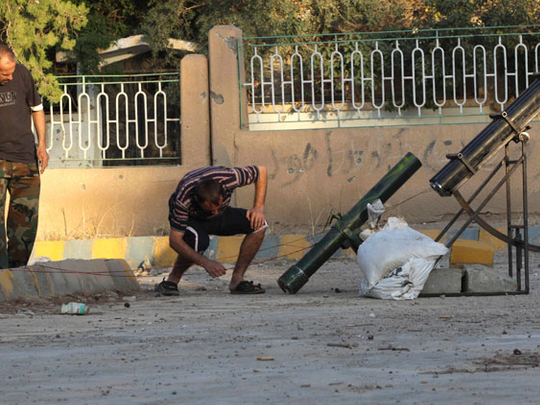
This is the biggest question confronting the so-called “international community” regarding what to do with Syria and the answer for the West has been a resounding “NO”. So we wait and it is fascinating to watch the unfolding of the regional geopolitics, but it is terrible to see the destruction and potential dismembering of Syria.
If Syria were to split into ethnic enclaves, as has happened to a certain degree in north-eastern Kurdish Syria, this will lead to higher levels of sub-national autonomy, as what occurred in northern Kurdish Iraq. We could be witnessing the first spasms of a pan-Middle Eastern confederation of regions, much like sub-national federal systems in Europe.
But that is far away still. For now, we are stuck with the state and its purported right to exercise discipline and impose security — even if the citizens are staging a revolt. This is the card Russia and China play when explaining their veto of the United Nations Security Council vote to intervene in Syria: Bashar Al Assad’s regime is the legitimate state authority and must be respected as such.
Russia has vetoed Security Council votes before regarding the status of Chechnya for example. But the problem here is that when Russia sends weapons to Bashar Al Assad and he uses them against his citizens, it does not look very legitimate. Why are Russia and China really supporting a military dictatorship that is violating international law and abusing its authority?
Beyond the global positioning of power geopolitics, the fact that the Security Council is divided on Syria makes the UN unable to prevent and manage conflicts. Not to mention the rapid exit of the Austrian contingency from the UNDOF (United Nations Disengagement Observer Force) peacekeeping mission in the Golan Heights after the kidnappings by Al Qaida-related militants.
It was the UN that adopted the “right-to-protect” (R2P) concept in 2005. R2P was advanced by former Australian foreign minister, Gareth Evans, and his colleagues in 2001, largely in response to the massacre of Srebrenica during the Balkan Wars in the 1990s and to the horrendous ethnic cleansing of Tutsis by the Hutus in Rwanda, also in the mid-1990s.
Right or Wrong?
By adopting the concept of R2P, the UN made military intervention a humanitarian imperative and a moral question of right or wrong. Led by the post-Second World War trio (the US, Britain and France), also known as the “West” or the “international community”, these countries could use the morality card as leverage in brokering foreign policy.
After Rwanda and the Balkans, who could argue that the Taliban needed to be deposed? And that Saddam Hussain should also be overthrown? (Even though both were allies to the US in the 1970s and 1980s against the Soviet Union and Iran ... that’s old water under the bridge, now there are natural resources at stake that need to be exploited.)
And yet, we are waiting and watching the tragedy in Syria unfold without really reacting. Sending small arms to the “opposition” is arguably worse than sending in troops: The bullets and bombs will be used up quickly (precisely the point of selling arms) while troops will be able to restore some relative calm for diplomacy to bring the conflicting sides to a negotiating table.
There will be no negotiations in the near future as regional powers are becoming increasingly involved, largely split along religious lines (Qatar and Saudi Arabia leading the Sunni; Iran and Hezbollah supporting Shiites and Al Assad’s Alawites). The war is more complicated than just sectarian divides, much more complicated, and perhaps for this reason the West is reluctant to engage.
However, the “international community” looks weak and hypocritical: Does the West only intervene when there are resources to exploit? Is Europe really not capable of deploying its so-called “battle-groups”? There is definitely enough military money and know-how for Nato to take out Al Assad and his elk, as they did with Muammar Gaddafi in Libya. So why not?
The “right-to-protect” stipulates that the international community can intervene in a state without consent when a state is violating international law, committing mass atrocities, and so on. The decapitations in early July are sufficiently gruesome evidence that the war has gone beyond just regime versus opposition. Perhaps it is too late for the West to intervene.
Countries, like people, interfere in other countries’ business. Other states, militant groups and local factions are already embroiled in Syria. Military intervention in Syria by the international community will be considered a “just war”; it will be the most moral move the West can make, but having not acted immediately it will also be a most costly intervention in terms of men and money.
The West should intervene, but it will not due to the certainty of incurring casualties.
Stuart Reigeluth is founding editor of Revolve magazine.










